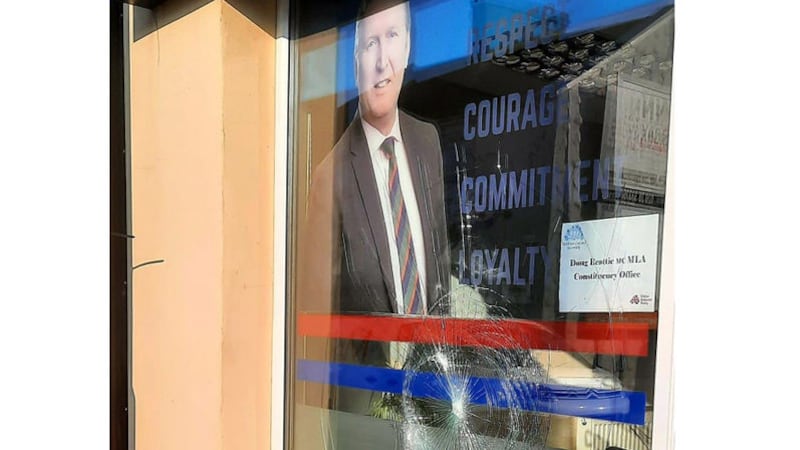When I wrote two weeks ago in this column that unionist unity over the protocol wouldn’t last, I didn’t anticipate it would fall asunder just quite so quickly and result in Doug Beattie getting his windows put in.
As leader of the Ulster Unionist Party, Beattie was faced with a simple choice: continue to join with the TUV, DUP and loyalists at public rallies which were ramping up tensions or distance himself from an ever more unruly mob without a strategic plan.
He said the rallies, the most recent of which took place in Ballymoney last Friday night, were being "used to raise the temperature in Northern Ireland and adding to tensions that now see a resurgence in UVF activity".
There really was only one option open to him in the wake of the security alert in north Belfast last week which resulted in foreign affairs minister Simon Coveney being forced to leave an event being hosted by the John and Pat Hume Foundation.
It is all very well and good for organisers to say that the protests are legitimate (they are) and they should be wholly peaceful (again, agreed) but you can’t then say Irish government ministers are not welcome in the north and then be shocked when the UVF hijack a van and force a peace event to be evacuated.
Beattie has said that he accepts the decision to withdraw from street protests may cost the party at the ballot box on May 5 but said: “I won’t lie for a vote.”
Brexit has foisted a political maturity on a lot of people who were previously content to tick along with the status quo but who now have reached a point where they are engaged and prepared to articulate what they want. That could very likely translate to an increased turnout in the assembly elections on May 5. An increased turnout is likely to favour the UUP, given the numbers of unionist voters who have been inclined to stay at home in recent elections. He may not see the party’s vote reduce at all.
The battologists on the platform at these rallies continue to single out the Irish government for their ire and it is interesting to note recent “enough is enough” warnings to the British government about Carson raising an army in 1912 to oppose Home Rule.
When democracy or equality rears its head so too does unionist violence. Fifty years ago this month, William Craig stood in Ormeau Park telling a rally it was time to “liquidate the enemy.” Weeks later, tens of thousands of unionists marched to protest the collapse of Stormont. Today, they want to pull down the same institution.
So what’s the difference? Well, the 1972 version was a desire to maintain an apartheid state and the 2022 version is to avoid democracy installing a nationalist first minister.
There is, of course, another unionist game afoot and that is to change the terms of the Good Friday Agreement regarding a border poll from one requiring a simple majority to one that requires a majority from both communities. In other words, the continuation of the unionist veto.
The Brexit vote was the legacy of colonialism. The British have been used to being in power and wielding the authority and to having other nations capitulate. The legacy of that is an inability to compromise.
Getting Brexit done was a great slogan with no meaning. Withdrawing from a huge trading bloc and trying to go it alone by negotiating individual trade deals with every other country in the world was a huge undertaking that nobody thought through. They actually thought they would just do it and everyone else would agree to whatever Britain wanted because that is what they have always done. They forget that in many instances, they agreed to it at the point of a gun and not because they thought it was a great idea.
The mentality of the great British Empire still exists in the upper echelons of the Conservative Party and too many of the English electorate 'took the soup' and forgot when they cast their leave vote that the Empire was built on the bodies of their grandfathers and great grandfathers.
The divide and conquer colonialist approach runs through the unionist and loyalist response to the protocol in the constant attempts to hive off the Irish government from the EU 27 and make out that they are the problem, that they single-handedly wrote the protocol and forced it on Britain. It’s not working.
The EU 27 is currently united in its response to the war in Ukraine. It’s tackling rising energy costs by seeking to put in place new supply chains and providing humanitarian aid and refuge to millions of displaced civilians.
Whether or not sausages need a cert to travel across the Irish Sea isn’t exercising minds in Brussels right now.
The British government knows this and it’s why we’ll see them talking the talk but not walking the walk on reopening negotiations on the protocol for the foreseeable future.
You can see why unionism might feel the need to invoke Carson’s ghost.








